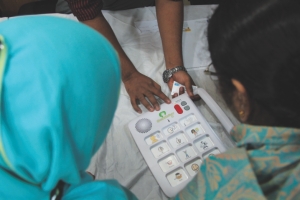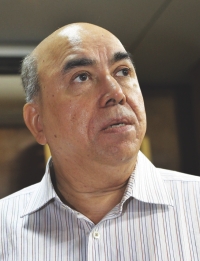| Home - Back Issues - The Team - Contact Us |
 |
| Volume 11 |Issue 36| September 14, 2012 | |
|
|
Sci tech Freedom from Dependence Karishma Enterprise brings technologies for people across disabilities, which promises freedom from the clutches of dependence on others Tamanna Khan Access to the internet is supposed to open the world before you. You become equipped with the most important tool of the 21st century: information. But what if, a physiological barrier stands between you and the information that empowers you? How do you read, comprehend or listen to the information if no light and sound reaches you or even the slightest movement of a finger is impossible for you?
In most cases in our country, persons with special needs are left in the dark, deprived of knowledge. The very few, who do get access to education, need the assistance of family members, friends and teachers. “Braille books were not that easily available during my school years", recalls Sheikh Golam Mohiuddin, Assistant Coordinator, Training and Education, Centre for Disability in Development (CDD. "Though there were some Braille books at the primary level, only 50 percent of high school texts were in Braille. For the rest we had to ask someone at home to read to us or ask a friend for dictation and note it down in Braille. At higher education, there were no Braille books at all. We had to look for reader service, or note down teachers' lectures in Braille or make audio records”, he adds. Today, there are technologies available in the world, which can help a visually impaired person such as Mohiuddin, read a book without the help of a human assistant or by converting the text into Braille. In fact working as a volunteer in the two-day-long exhibition on Assistive Technology for Education and Employment of Persons across All Disabilities, Mohiuddin demonstrates a device that scans and reads any printed material placed on it. “If you want a book to be read out to people who cannot see the print or are illiterate, this device can be very helpful,” he says showing the Sara CE Instant Text Reading Machine, which looks like a normal scanner with a camera fitted on top. He adds, “If this device is kept at, say, public libraries or libraries of other educational institutions, it will help the visually impaired with their studies. This device can save the documents it scans. You can save 4000 books of around 200 pages each in this machine.” Organised by CDD and hosted by Daffodil International University, the exhibition has displayed 18 different assistive technology products brought by Karishma Enterprises. A presentation by Ram Agarwal, Chief Executive Officer of Karishma Enterprises and Index Assistive Technologies, has explained the usage and importance of the products. Parents of children with special needs, physicians, therapist and organisations that work with people with special needs participated in the exhibition and seminar, to learn and talk about these technologies brought home by Karishma.
Agarwal's companies are the distributors for India and neighbouring countries for world renowned developers of assistive technologies. In his presentation, Agarwal explains assistive technology: “the new age devices and software that provide support to the disabled to overcome their disability and perform their tasks in a normal environment efficiently to compete on a level playing field with their non-disabled peers”. The thought to empower people with special needs, came at the age of 38, when he started losing his vision because of macular degeneration. He felt the need for technologies that would make his day-to-day activities such as reading and seeing possible. Working in his family business that dealt with engineering products for industries, Agarwal already had access to international contacts that helped him in his search. He came across a reading machine which read out his letters and documents. The company which produced the reading machine then asked Agarwal if he could help them distribute their products in India. “I looked at it as a welfare and social service and we decided to go ahead and help our people in India, who cannot see and need this kind of facility,” he reminisces. Agarwal relates how grave the situation was in India 20 years ago for persons with special needs. “I had the opportunity to visit a blind school. I was shown that blind people are weaving canes and making incense. They said, 'since these people are blind these are the only professions we can give them'. That really affected me,” he recalls. Later when he learnt about JAWS, a talking software that helps the visually impaired operate computers and already in extensive use in foreign countries, Agarwal decided that he needed to change the scenario in India too. He travelled across the country demonstrating how visually impaired people can also operate computers. Faced with scepticism at first, he soon developed people's confidence and opened a NGO, the Indian Association for the Visually Impaired, which trains the visually impaired on computers, with the help of JAWS. “Today we have more than 100 centres in India, training computers to the blind with the help of JAWS software,” he informs. Many of the trainees are now working as computer programmers and medical transcriptionists; some even holding senior positions in corporate houses like IBM. Karishma Agarwal, accompanying her father in this tour, tells the story of Zamir Dhale, a visual and hearing impaired student at the Hellen Keller Institute, Mumbai. Zamir, who got computer training with the help of assistive technology, such as the Braille Display, now works as vice president advocacy at Sense India International. During the presentation, Karishma also informs the audience that Zamir had trained Rani Mukherjee for the Hindi movie Black, released in 2005, on the life of a deaf-blind woman.
Besides technologies to assist the visually impaired, Agarwal started looking for computer related technologies to help people with other disabilities. “Today we cover almost all kinds of disabilities --- blindness, low-vision, dyslexia, autism, cerebral palsy, speech, hearing, locomotive impairment etc.” he says. A group of teachers from the Autistic Children Welfare Foundation have attended the presentation and exhibition and shares their opinion about the products. “There are some products which we can use for our autistic children but the products are very expensive. But if we could use it at our organisation, it would have been very helpful,” says Rahima Khatun Rita, one of the teachers of the foundation. They explain how the Quick Talker Communication Board, which has a number of buttons with icons for different items, will help autistic children express their needs and feelings. Regarding the price of the products, Karishma says that the technologies exhibited are from different parts of the world. “These are not made in India. The high pricing is only because of the exchange rate,” she clarifies. Giving example of the Braille Display for the deaf and blind which comes around Tk 1.5 lakh, she informs, “In Mumbai, India, we have an organisation called Hellen Keller Institute. They have used this Braille Displays to teach computers to the deaf-blind. Since deaf-blind people are poor they are not able to buy these machines themselves. But because of this technology they have learned to use computers.” Ram Agarwal explains how they overcome the financial challenge in India. “Through our NGO we were able to mobilise the funds through donors. The State Bank of India came forward when we told them about our concept,” he relates how organisations like Microsoft Corporation in USA also sponsored the centres that provided computer training to persons with special needs, with the help of these expensive assistive technological products. “It is also possible, I think, in your country. If all the corporate houses, nationalised banks and the government come forward it is not difficult at all to have set ups and similar centres all over Bangladesh.”
Copyright
(R) thedailystar.net 2012 |


